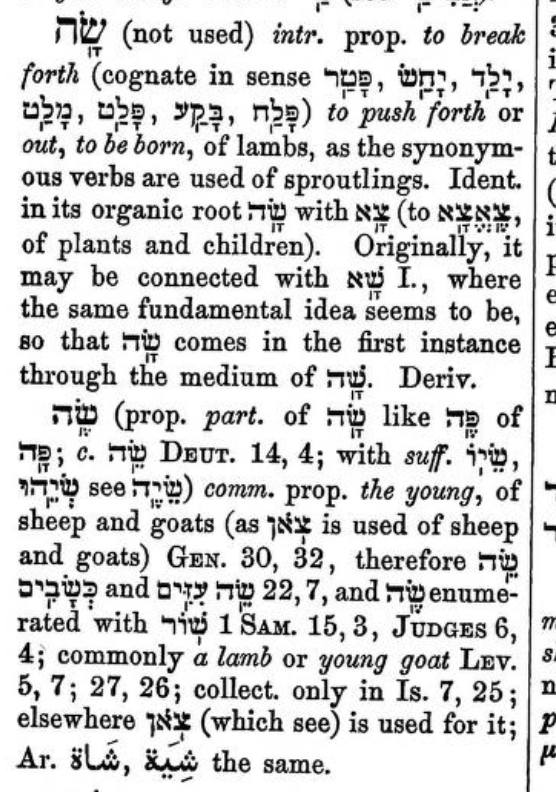 Genesis 22:8
Genesis 22:8

שה - A young sproutling of either Sheep or Goat
And Father of Multitude is saying, "Mighty ones is appearing to himself, the Sproutling, for a smoke sacrifice of the son of myself." And they are walking, the pair of themselves, united.And Abraham will say, God will see to himself the sheep for a burnt-offering my son: and they will go, they two together.
And Abraham said, My son, God will see to the lamb for Himself, for a burnt offering. And the two of them went together.
And Abraham said, God will provide himself a sheep for a whole burnt offering, my son. And both having gone together,
Footnotes
| 749 | Genesis 22:8 Hebrew אלהים יראה לו. The commentaries recognize the literal, “Heb. see for himself” (Cambridge Bible on Gen. 22:8). The idea of “providing” is not the real word, but a (very) interpreted meaning from perceived contexts. The addition of לו to himself further complicates the verse, as "seeing to himself" doesn't make much sense. Hence, the translation of יראה in the niphal passive conjugation, "he is being seen/he is appearing to himself." See for example, Leviticus 14:35 where the Niphal form in the perfect נראה לי is used with the same preposition, "he has appeared to myself" Exodus 13:7 uses the same exact construct and preposition, ולא יראה לך "and it/he is not appearing to yourself." Every other instance of this construct was translated as "being seen/appearing." (cf. יראה occurs 13 times) |
| 749b | Genesis 22:8 Strongs #7716 שה does not mean "lamb." It is a word specific to a sproutling from either sheep or goats. See Deuteronomy 14:4: שה כשבים ושה עזים "a seh of lambs and a seh of goats" Fürst, Julius. A Hebrew & Chaldee Lexicon to the Old Testament. Leipzig: B. Tauchnitz; London: Williams & Norgate, 1885, p. 1348.
|
| 750 | Genesis 22:8 A vague notion of two selves becoming one—united? This fits as part of Abraham’s dialogue. Quotations don’t exist in the Hebrew. |
